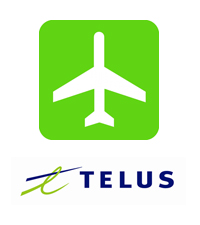 In a somewhat surprising move, Telus is moving forward with plans to halve the rates the carrier charges for data roaming. This means a 50 percent reduction from the average of $25 subscribers had been paying up to this point.
In a somewhat surprising move, Telus is moving forward with plans to halve the rates the carrier charges for data roaming. This means a 50 percent reduction from the average of $25 subscribers had been paying up to this point.
Canada has been something of a doormat when it comes to mobile costs. Ranking last amongst industrialized countries in costs, Canadians pay an average service fee of $10 to $25 per megabyte when roaming. The full cost of $25 amounts to just 10 photos being downloaded to, or uploaded from, a mobile phone.
This is in stark contrast to the OECD (Organization for Economic Cooperation and Development) average, which stands at a range of $9.48 to $13.52. As the third-largest telecom firm in Canada, Telus’s move puts the company within that range.
In a statement about the rate cut, Telus VP of mobility marketing, Brent Johnson, indicated that the rate cut still keeps the company profitable — a fact unlikely to surprise anyone who follows the industry.
He went on to note that Rogers had a monopoly on roaming fees in the days when it was the only GSM carrier, the same technology used in most of the world. Telus and Bell were using CDMA, which was mainly limited to the United States. But rather than cut prices after launching their own 3G networks, Telus and Bell ultimately matched what Rogers was already charging, thereby leading to the inflated fees Canadian travellers have paid since.
Though new entrants like WIND Mobile, Mobilicity and Public Mobile have offered very competitive long distance and roaming plans, the moves haven’t yet translated into a wider price war between them and the incumbents.
In addition to the roaming rate cut, Telus also announced a deal it made with Skype to allow subscribers to buy SkypeOut credits through their Telus accounts. Skype credit is like a prepaid service where the deposited funds can be used to make calls to mobile and landlines using the software on a PC, Mac or smartphone.




Thanks for your comments, Elise.
Looking more closely at your assertions, there are some observations I wanted to share.
The Travel Pack you refer to is a predefined amount, both in terms of money and time. Yes, the average cost can be as low as $3 per MB but this is based on an average. A customer is forced to pay $30 to have 10 MB for a duration of 30 days. Assuming someone is only travelling for a short stay and wouldn’t need more than, say, 1 MB, they have no option.
The Telus plan, while also still very expensive, appears more friendly to consumers because there is no floor or ceiling involved. If I were to roam under what Telus is doing, and only used 100 KB of data, I should be charged only for that amount. At the reduced rate they’re offering now, that would amount to about $1.20. Still ridiculously high, in my view, but more reasonable for those who need very little data when away.
Where I agree with you is on the value of having a bundle when there are customers who need it. It’s naturally much better to pay $30 for 10 MB, then it is to pay $100-$120, but only if it makes sense for the customer purchasing that pack.
The sheer fact that Telus would still be “profitable” after cutting the rate in half speaks volumes about just what the profit margins are. The real question should be exactly how much does it cost Telus or Rogers or Bell per MB of roaming data?
Charging less for bulk purchases is standard business practice, but when the $60 roaming travel pack provides 75 MB at an average cost of $0.80, it makes one wonder. That’s almost a 75% reduction in cost-per-MB from what the $30 plan offers. In other words, if $0.80 is still turning a profit, then $3-$5 is making a killing.
And $10 is just gouging.
Hey there
I am Elise from Rogers. I would like to follow-up on your blog post and addressing some comments here.
As you correctly explain, Telus didn’t launch any roaming rates until 2009. That’s because until that time, Rogers was the only carrier to have made the right choice for our customers and built a GSM network in Canada, which is an international standard and allowed our customers to roam abroad. We have worked hard to deliver world class coverage with direct agreements to 600+ operator networks.
Our competitors finally adopted this technology in 2009 and are just now lowering their rates, even though they launched more than a year and a half ago.
Moreover, Telus will, in his move, reduces choice for customers by offering only one rate for everybody, whether high usage customer or not. We think customers should be offered a variety of choice and have had for a long time various travel packs. We are constantly innovating to introduce new plans and pricing as we aggressively negotiate directly with roaming partners around the world.
Today, Rogers customers can buy travel packs that provide them with rates much lower than the flat rate our competitor has advertised. The most they would pay for a Travel Pack is $5 per MB and the lowest is $3 per MB, whereas Telus’s new rate will be $10/MB.
Our goal is to make roaming affordable for our customers and we’re continually looking for ways to deliver this to them.